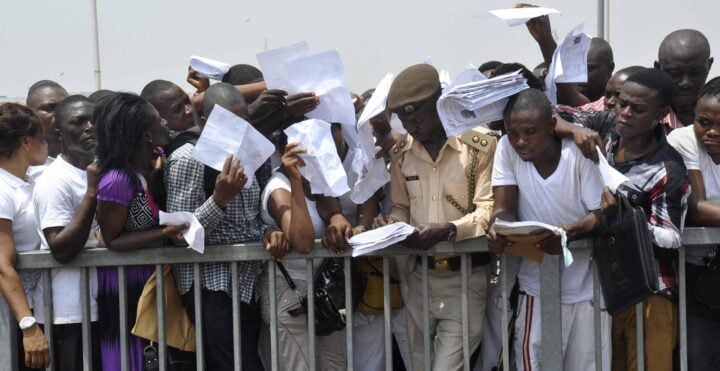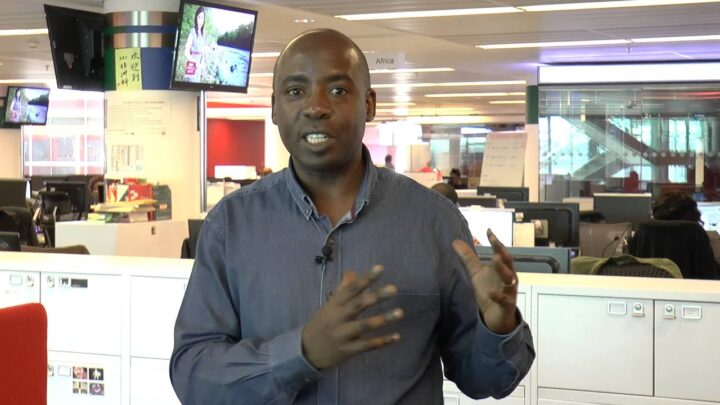File photo of applicants trying to submit their test questions to an immigration officer
Ajuri Ngelale, senior special assistant to President Muhammadu Buhari on public affairs, has said the country’s unemployment data failed to adequately captured informal sector.
Small and medium enterprises (SMEs) account for 96 percent of businesses in Nigeria and 84 percent of the employment, per a PwC report. Out of the figures, the Corporate Affairs Commission (CAC) had said 40 million small businesses were left unregistered — playing in the informal sector.
According to the National Bureau of Statistics (NBS), the unemployment rate increased to 33.3 percent in the fourth quarter of 2020 from 8.9 percent in the second quarter of 2015.
But speaking on Arise TV on Tuesday, Ngelale faulted the NBS unemployment report, describing it as “inaccurate”.
Advertisement
He said it is untrue that Nigeria recorded 8 percent unemployment rate at any point in the last 20 to 40 years.
“Do you think that at any point in the last 20 or 40 years in this country that we have 8 percent of the 200 million population unemployed,” he asked
“Do you believe that we have 16 million people out of 200 million unemployed in the last 20 years? I don’t believe that’s accurate at any point.
Advertisement
“Specifically not in 2015 when the value of the currency was falling off the table and we were moving into a recession as a result of the global oil crash. I don’t think anyone believes that we have ever had an 8 percent unemployment rate in this country in modern history.
“We have to understand two things. First is the accuracy of data. None of us believes that we had 8 percent unemployment anytime in the last 40 years. That is ridiculous.”
Ngelale said Buhari was yet to fully commence his administration in the early part of 2015 when NBS gave the Q2 figure.
He said there are several Nigerians owning businesses without due registration with Corporate Affairs Commission (CAC) or Federal Inland Revenue Service (FIRS), adding that such persons are often captured as unemployed.
Advertisement
The presidential aide said the country is battling data collection challenges, adding that efforts are being made to address the situation.
“In the first part of 2015, it (NBS) was not our agency, but an agency of the federal government of Nigeria, we were not in government at that time,” he said.
“By the way, this is supposed to be a non-partisan institution, so it’s not about who is in power or who is not in power. The issue is not about whether the government looks good or bad.
“The issue is about whether the data is accurate so you can effectively plan as a government future economic interventions.
Advertisement
“In this country, we have tens of millions of informal enterprises, informal entrepreneurs, people who own market stores and markets across the country, small boutiques and shops, who may not be formally registered with the CAC as a company name or FIRS paying taxes.
“They are not only over the poverty line, they are actually employing other Nigerians who are over the poverty line.
Advertisement
“But because of how data has been tabulated over the last decade-plus, all of these MSMEs, numbering up to tens of millions and not just a few thousands, are being tabulated as unemployed and under the poverty line, when in fact it is the opposite.
“We have a very serious challenge around statistical data collection and accuracy which is something we are working to address. So we want an accurate picture not to make us look good or look bad but to get an accurate picture of how well we can effectively intervene in the economy.”
Advertisement
‘ONE MILLION JOBS YEARLY INSUFFICIENT FOR GROWING POPULATION’
Ngelale said the creation of one million jobs every year would not translate into a reduced unemployment rate.
Advertisement
He explained that about two million youths join the labour market yearly in search of jobs.
The presidential aide added that the government is working to improve infrastructure and attract private investors in creating needed jobs.
“If we created more jobs every single year, which is by far, in a way, the most jobs any administration would have created in the history of the country, the unemployment rate would still grow,” he said.
“This is because right now, we have about 6,000 graduates joining the labour force every year. This is in addition to 1.2 million non-graduates, meaning you have approximately two million.
“So if you create one million jobs every year, the unemployment rate would still be exponentially growing because you have to be able to cater for two million people coming into the labour force every year.”
1 comments







So, Ajuri Ngelale, what has been the average unemployment figure for the country in the last 20/40 years? Or, still, since 2015, what’s the unemployment rate? Not once, did you give or cite any figure?
this is a clear case of how to lie with statistics!